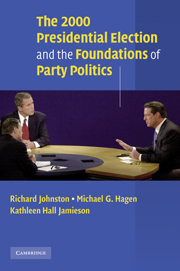Book contents
- Frontmatter
- Contents
- Acknowledgments
- 1 Introduction
- 2 The Evolution of Vote Intentions
- 3 The Landscape
- 4 Ads and News: The Campaign as a Natural Experiment
- 5 The Economy, Clinton, and the First Phase
- 6 Candidate Traits and the Second Phase
- 7 Social Security and the Third Phase
- 8 Conclusions
- Appendix
- References
- Index
1 - Introduction
Published online by Cambridge University Press: 28 May 2010
- Frontmatter
- Contents
- Acknowledgments
- 1 Introduction
- 2 The Evolution of Vote Intentions
- 3 The Landscape
- 4 Ads and News: The Campaign as a Natural Experiment
- 5 The Economy, Clinton, and the First Phase
- 6 Candidate Traits and the Second Phase
- 7 Social Security and the Third Phase
- 8 Conclusions
- Appendix
- References
- Index
Summary
This book aims to unite two research traditions that are usually seen as competing. With some noteworthy exceptions on both sides of the disciplinary aisle, one tradition has been articulated mainly by communications scholars and the other mainly by political scientists. To perform the nuptials, we deploy unique bodies of evidence from one of the more compelling presidential elections in living memory, the virtual dead heat of 2000. In the campaign, all the factors that drive political science models were in play at least some of the time – abiding elements of social structure, geography, party identification, and ideology; the economy and other aspects of the record of the previous administration; the perceived fitness of each candidate for executive office; and issues reaching back to the New Deal. But these factors did not operate automatically. They were activated and in some cases critically altered by campaign communication – its overall volume, its partisan direction, the consistency of messages across communications channels, and the rhetorical sophistication of the messages themselves.
To make our case, we focus on three phases in the general campaign and on the critical transitions between them. The first phase was produced by the conventions and lasted for more than a month. In this phase, predictions from econometric forecasting models for a comfortable victory by Al Gore seemed bound for success, as, of course, was Gore himself.
- Type
- Chapter
- Information
- Publisher: Cambridge University PressPrint publication year: 2004
- 2
- Cited by



